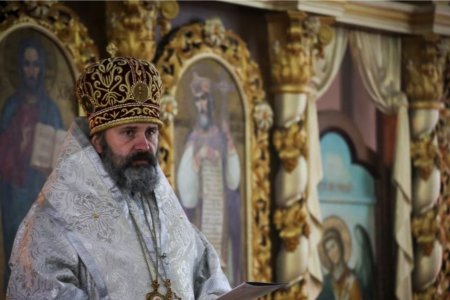
Russian occupation ‘authorities’ have seized control of the Church of Christ’s Resurrection in occupied Crimea in what Father Yaroslav, rector of the church, views as the latest attack on the Orthodox Church of Ukraine, and on Ukrainian identity in Crimea.
Father Yaroslav informed Holos Krymu [Voice of Crimea] that the local occupation authorities ‘sealed’ the church on 4 October, claiming it to be the property of the local occupation administration. The Church of Christ’s Resurrection is in the settlement of Biiuk-Onlar in the Kurmansk raion of Crimea, which Russia continues to call Oktyabre. Its congregation had worshipped there since 2002 when they decided to transfer from the ‘Ukrainian Orthodox Church under the Moscow Patriarchate’ to the Kyiv Patriarchate (now the Orthodox Church of Ukraine, or OCU).
This is the latest such attack on a place of worship under the Orthodox Church of Ukraine, Father Yaroslav says, which is being carried out by the occupation regime, abetted by local collaborators who betrayed Ukraine and are trying to prove their worth to their new ‘bosses’. “The destruction of the Ukrainian church is the destruction of the Ukrainian language and culture, of Ukrainian identity for a considerable part of the peninsula’s population, for whom the Church remains the only centre of Ukrainian identity in Crimea”,
Andriy Shchekun, Authorized Representative of the Crimean Diocese of OCU, stresses that Russia’s destruction of the Orthodox Church of Ukraine in occupied Crimea is about more than the destruction simply of a religious structure. “We are witnesses to how the Ukrainian community of Crimea, their national civic associations and political structures, as well as clergy from the Crimean Diocese of the Orthodox Church of Ukraine, did not collaborate with the occupation regime, did not choose to collaborate for personal gain. This is not merely the occupation regime’s revenge for resistance, it is Russia’s deliberate, century-long policy, aimed at destroying the entire Ukrainian people. It is effectively ethnocide, and we should speak of this and document Russia’s crimes for which it will finally answer.”
Although all faiths, except the Russian Orthodox Church, rapidly came under fire after Russia’s invasion and annexation of Crimea, it was the then Orthodox Church under the Kyiv Patriarchate, which came under particular attack. This was doubtless because of the strong pro-Ukrainian stand demonstrated by the Church and especially Archbishop Klyment, and because of the public statement issued on 11 March 2014, condemning Russia’s occupation of Crimea.
Russia has, indeed, set about eradicating the Ukrainian language and everything linked with Ukrainian identity on any territory that falls under its occupation, with this first evident in Crimea. For very many Ukrainians, the Church provided a vital focal point for people wanting to hear Ukrainian and be with Ukrainians. The Archbishop himself came under attack for his impassioned appeals to the international community on behalf of believers, and in defence of Russia’s ever-increasing number of Ukrainian political prisoners. Russia’s attack was also, of course, about banal plunder, especially of the Cathedral of Saints Volodymyr and Olha in Simferopol. It was after Moscow’s attempt to bribe Archbishop Klyment with a substantial amount of money to vacate the Cathedral failed, that Russia resorted to other illegal methods to drive the Church out of the Cathedral, the Crimean Diocese centre,and, ultimately, out of occupied Crimea.
As reported, illegal occupation ‘courts’ began procedure to try to force the Church, first out of part of the Cathedral, then from 2019 out of the entire premises. It even ignored the intervention of the United Nations Human Rights Committee which called on it to halt the planned eviction.
In July 2018, a law on land registration was changed in order to cancel any acts which had not been re-registered under Russian law. It had long been clear that the demand for re-registration would be used to either force religious communities to accept Russian citizenship and jurisdiction, or to drive them out of Crimea. For a very long time, the Crimean Diocese rejected any suggestion of such re-registration which effectively entailed recognition of Russian rule. In fact, however, faced with the real prospect that his congregation – and all Ukrainian believers in Crimea – could be deprived of any church, Archbishop Klyment did, finally, file for such re-registration, however only of the congregation, not of the Diocese itself. The occupation authorities found pretexts for three rejections of this application.
Despite the UN Human Rights Committee’s halt on proceedings, Russians burst into the Cathedral on 11 May 2023 and began the plunder that they cynically called ‘liberation’ of the Church’s premises.
By late 2023, it was also learned that all Orthodox Church of Ukraine had been forced out of Crimea, with Russia using the threat of forced mobilization into Russia’s army as its final weapon.
In July 2024, the Russian occupation ‘authorities’ in Yevpatoria began demolishing the Holy Cross Chapel in that city. At the time, this was reported to have been the last remaining Orthodox Church of Ukraine [OCU] place of worship in occupied Crimea. It seems that this was not the case, with the occupation regime now having appropriated the Church of Christ’s Resurrection.
Russia only withdrew from the European Convention on Human Rights in 2022 (after being effectively expelled from the Council of Europe over its full-scale invasion of Ukraine). Its attempts, therefore, to deny the jurisdiction of the European Court of Human Rights and its damning judgement of 25 June 2024 in the case of Ukraine v. Russia (Re Crimea) are pitiful. The judgement found that Russia had violated all rights enshrined in the European Convention (except the prohibition of slavery), with this, of course, including the right to freedom of thought, conscience and religion (Article 9).



